Even without a functioning website attached to it, domain names can be incredibly valuable by themselves. Sites like Domain Sale History show just how much money people are willing to spend on the right domain name.
This means that often the best domain names are registered and renewed year on year, leaving sub-standard alternatives for those who aren’t willing to shell out a fortune to take ownership of their preferred domain.
For a few years now I’ve been buying and selling UK domain names online as a hobby. It doesn’t make me a great deal of money, but there’s something exciting about digging out potentially valuable domain names, like a modern day Bargain Hunt.
Here’s a few of the sites and processes I use to seek out good domain names.
Contents
What Makes a Good Domain Name?
Finding the right domain name is one of the most important steps for any business setting up online.
A great domain name can help with SEO and give your business instant credibility with potential customers.
A poor domain name, on the other hand, can hinder your digital marketing efforts before you’ve even started working on a website.
Domain names that could be useful for SEO are in high demand, even if there is no existing site associated with it.
There are 3 things I look for in a domain name, both in terms of SEO and potential brand/business value:
- Relevance – does the domain relate to the services your provide or product you sell? Does it feature a target keyword?
- Length – would it take someone more than 5 seconds to type it into the URL bar? Then it might be too long.
- Memorable – if you gave your URL to someone on the street, would they be able to remember it when they get home?
Additional characters like hyphens and numbers or slight variations on spelling also reduce the value of a domain name, so generally these are best avoided.
Finding an Unregistered Domain Name
‘Hand registering’ is by far the cheapest and easiest way to get a domain name. For about £5.99 you can register a name from any of the main providers and take ownership instantly. You could even have a website up on the URL within minutes.
You can only do this, however, if the domain name is unregistered; either nobody has registered it previously, or the previous owner has allowed it to expire and ‘drop’, with nobody else registering it after that.
It’s easy to find out whether a domain is unregistered. Just go to a provider like GoDaddy and type the domain into the search bar, and you’ll soon be told if it’s available to register.
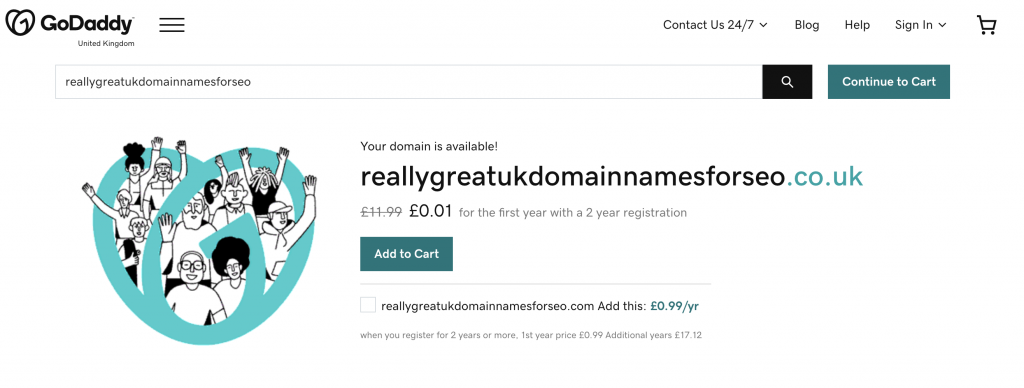
As domain names are prime digital real estate, it’s very rare to find a valuable SEO domain name that is available to register in this way.
With a bit of keyword research, however, you might be able to find an untapped gem that has been overlooked. Using keyword tools like SEMRush can give you ideas of in-demand keywords which don’t currently have an ‘exact match domain’ registered – a URL that matches exactly the keyword people use.
I used this method to sell the domain name ‘painterdecorator.uk’ for £50 having registered it for £5.99. I saw that the term ‘painter decorator’ was searched around 18,000 times a month, so I knew it would be of value to anyone looking to build a site around that service.
You can also use SEMRush to find keywords with a high CPC. These are keywords that business are willing to spend big on to get clicks, generally meaning that the product or service has a very high basket value.
Again, I used this method to hand register ‘privatehealthquote.uk’ and sell it for £110. Though the search volume was low, the CPC was around $30, so someone putting a site on that URL could expect to make a good profit with the right domain name.
While it might not be a lot, it’s a decent return for the cost of London pint!

‘Catching’ Expiring Domain Names
Just like a journeyman lower league striker averaging 6 goals a season, domain names have expiry dates, after which they either become free agents or get snapped up by someone else on the cheap.
In order to remain the owner of a domain name you need to renew the registration before the expiry date. Annual renewal can be expensive when you own multiple domain names, so often people let their domains ‘drop’ and choose to not renew them. Others just forget or can’t be arsed to renew them.
Once a domain expires, it can be registered by anyone for the nominal fee (again, usually £5.99). While the date that a domain will expire is public knowledge and can be found using tools like Nominet’s WHOIS lookup, it’s not possible to know exactly what time that domain will drop on that date.
It could be 12.01am or 11.59pm. For a valuable dropping domain name there will be multiple potentially suitors monitoring the name and wanting to ‘catch’ it once it drops. Once it drops, the first to successfully register the domain gets ownership.
Even if you’re physically sat at your screen constantly refreshing every second of the day, you’re probably still not going to be quick enough to register your desired expiring domain. That’s because the majority of valuable expiring domains are caught by scripts which monitor the status of the drop thousands of times over the day of the expiry, and are then able to register the domain name to an account in a split second.
Want to catch a domain name? Then you might want to think about using a backorder service, which I explore later on in the post.
How to Find Expiring UK Domain Names
Believe it or not, the site Expired Domains is the place to go to find domain names that are expired and expiring. There’s a lot of crap out there, so scouring manual through the lists isn’t an option. Register for free and take advantage of the filter functionality.
I start by selecting the ‘Pending Delete’ tab and then opening up the filter.
Under the ‘Common’ tab and ‘Domain Name Settings’, I then select ‘no Numbers’ and ‘no Hyphens’ as that eliminates a lot of the spammy variations.
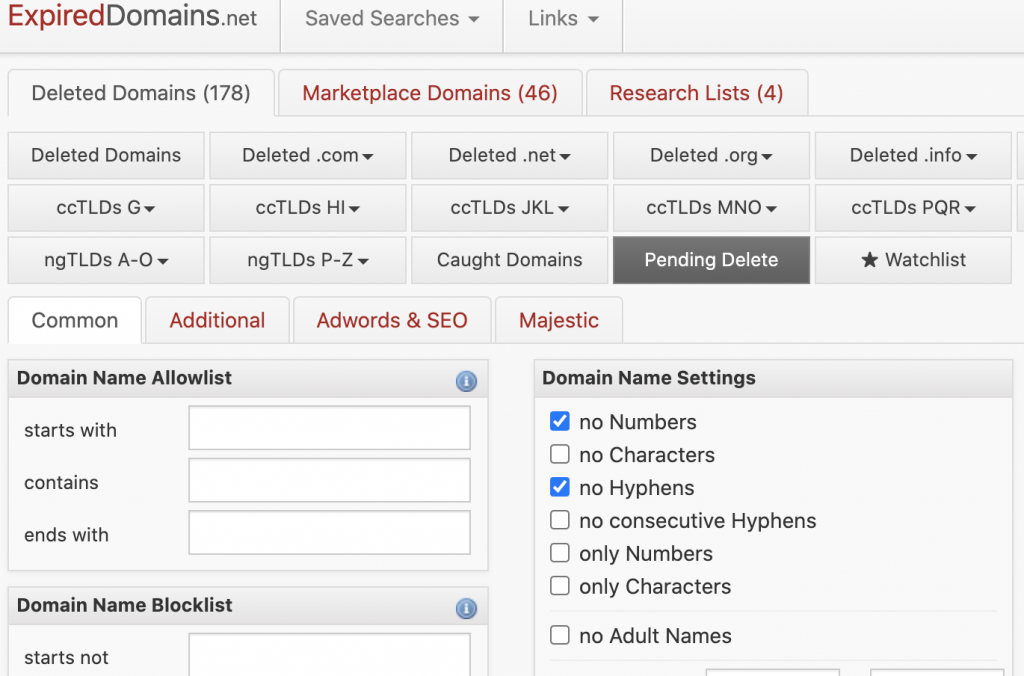
Most valuable domain names will contain a dictionary word, unless it’s a potential brand name. So select ‘English’ under ‘Dictionary Word Domains’, set Word Count to Min 1 and then the Max number of words. There are some valuable 2 word dictionary domains (like ‘teethwhitening.co.uk’, for example), but generally the shorter the better.
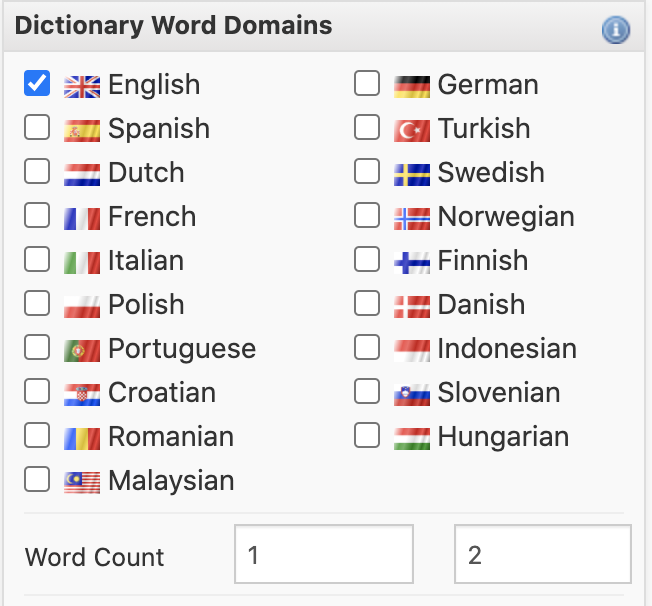
To look specifically for UK domains, select the ‘Additional’ tab and then ‘Country Code Second Level Domains’ for .co.uk. If you want to also look for .uk domains, select that under ‘ccTLDs – Country Code TLDs’.

This should now have whittled down the list of domain names to a manageable amount, but there are plenty of other options available on the filter – you can see SEO specific stats, for example, like number of backlinks and domain age, which could be useful for anyone wanting to use an aged domain to fire up backlinks to another site or use that domain to rank quicker.
You can also look for domains containing certain keywords if you are looking for a specific niche.
After applying the filter you can then sift through the domain names list and use the range of sorting options. One trick I like to use is to sort by the ‘Reg’ tab, which shows the number of other TLDs the domain name is registered on – usually a good indicator that it may be of value.
How to Backorder UK Domain Names
Lots of technical wizards write their own scripts to catch domain names, while others use backorder services like Dropcatcher and UKBackorder.
A ‘backorder’ is essentially a pre-order for an expiring domain, an instruction to the service to try and register that domain for you. However, it’s no guarantee that you’ll get what you want; with multiple scripts running simultaneously waiting for the drop, competition can be fierce and some scripts are quicker than others.
Some backorder services work on a ‘no catch, no fee’ basis, while other take payment up front but allow you to roll credits over for another domain name if initially unsuccessful. Prices for a single backorder usually range from £20-£50, while other more premium services charge larger monthly fees which allow you to backorder more domains.
Some backorder services, like Dropcatcher, only allow one person to backorder a domain through their platform; others will hold an auction if they catch the domain, with the registration going to the highest bidder.
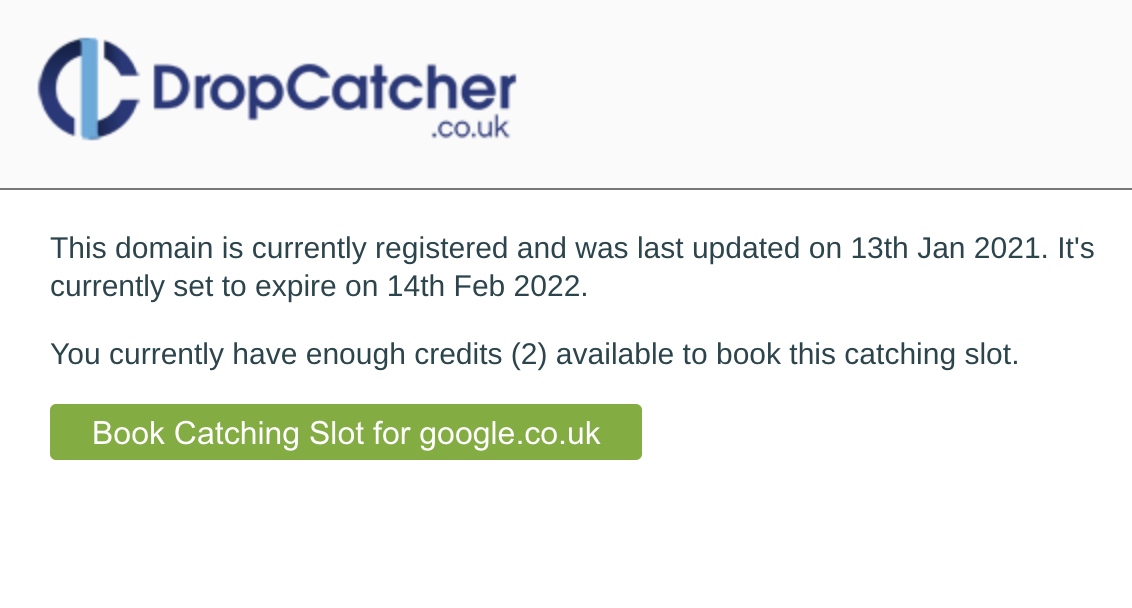
Worth a try?
Once you place a backorder, you just have sit back and hope that you get lucky. It’s a game of chance more than anything, so the more backorders you place with different services, the higher your chances are.
There’s also a chance that your desired domain will be renewed by the existing owner before it even gets a chance to drop.
If you do get lucky with a backorder, simply change the registration ‘TAG’ in the dashboard of your backorder service and claim ownership via whatever domain name registrar you choose. You may also need to change registration details in your Nominet account, as they are the official body responsible for UK domain name registration.
Using Your Expired Domain Name
If you’ve been successful with an expiring domain name backorder, you’ve got a few options:
- Build a site and put it on the domain
- If it’s an aged domain with existing domain authority, use the domain to help your SEO efforts on another site
- Do nothing and sit on the domain, as if it were an unopened vintage red in a wine cellar
- Park the domain and advertise it as ‘for sale’, in case interested buyers visit the URL directly
- Put the domain up for auction
How To Buy and Sell a UK Domain Names at Auction
Historically the most popular platform specifically dedicated to UK domain name auctions was Domainlore. While big sales can still be found there, it’s clear from Domain Sales History that sellers and buyers are now using alternative platforms such as Flip.
Flip is a relatively new site which offers a number of features that Domainlore does not, as well as a better looking design and user experience. Unlike Domainlore, where auction prices start at £50, domains can be listed and bought on Flip for as little as £10, while flexible duration options are also appealing compared to Domainlore.
There is also a marketplace on Flip, where domains can be bought and sold for a ‘Buy It Now’ price or offers can be made.
Domainlore is arguably the place for higher quality domains, though, as it has a stricter vetting policy. Premium domains go straight to the ‘Spotlight’ auction, while rubbish ones go to ‘hidden gems’ and are limited to 50 on the auction at any one time, with no more than 3 per user at once. If your domain name in ‘hidden gems’ receives a bid, it moves to ‘Spotlight’.

Recent sales on Domainlore
On the, ahem, ‘flip side’, Flip allows you to have up to 20 domain names listed for auction at any one time. Names still need to be approved for listing, but the quality is somewhat diluted when you can have so many listed at once.
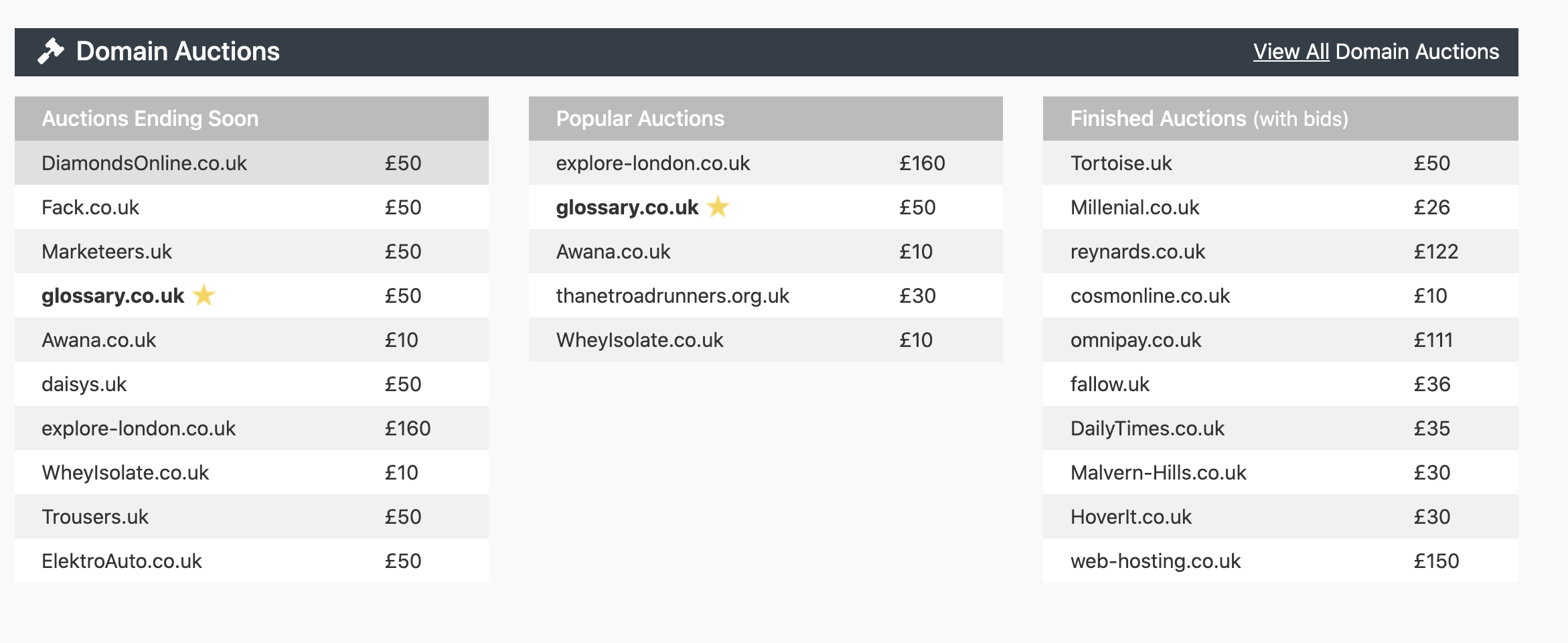
Recent sales on Flip
Payment and transfer via Domainlore and Flip are done on trust once the auction is complete. After payment is made, the buyer will then transfer the domain name to the buyer’s preferred TAG.
Then, of course, there are also a number of sites which aren’t focused solely on UK domains but allow you to list and sell them. The most popular of these are probably Sedo, GoDaddy and Namecheap.
Lots of sales are also conducted over forums such as Acorn Domains, where you can gather lots of great insight into domaining from experience users.
How To Assess Domain Name Value
While there are automated domain name appraisal tools like Estibot and GoDaddy Appraisals, they make their estimates based on limited data and have no understanding of the potential money making value of a domain name.
Really, there’s no substitute for good market research and experience. Recent domain name sales give a great indication of what’s currently in demand and the prices they fetch.
Likewise, a little bit of common business sense goes a long way when assessing domain names. Could that domain name be used for a site which makes money online? Then it probably has some value.
While there are fads and trends in domain name sales, there are 3 types of domain that always hold good value:
- One word dictionary domain names, featuring a word with high usage e.g. ‘research.co.uk’, or one with obvious commerce potential, like ‘flowers.co.uk’
- Two or Three letter domains, either as dictionary words or letters which might be used for company abbreviations e.g. ‘FBI.co.uk’
- Two word dictionary domains with ‘exact match’ for high volume keywords e.g. ‘holidayinsurance.co.uk’.
- Aged domain names with historical SEO value